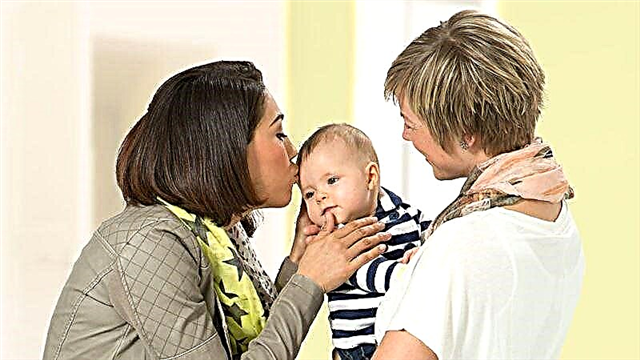A young mother is upset when she sees her child crying endlessly. She becomes helpless when she does not understand why this is happening and how to ease the pain he is experiencing. Stomach pain is a common problem in infants. There are many reasons for it. The baby's digestive system is still getting used to liquid food, so the digestion process can be uncomfortable and the newborn has a tummy ache.

The child has a tummy ache
How to understand that a baby has a tummy ache
There is no clear definition of what colic is or how it differs from other causes of crying. Doctors agree that the difference between crying due to colic and normal crying is that the baby seems inconsolable, crying turns into a cry. There is a tension in the muscles of the tummy, sometimes the whole body of the child, while the palms are clenched into fists, the legs are pressed against the stomach. A child can cry for a long time, turning crying into a test for parents.
One of the causes of pain is the accumulation of gas in the intestines, which occurs in almost every child at one time or another, regardless of whether he is breastfed or artificially fed. It is common in babies 1 to 4 months old due to their underdeveloped digestive system. The belly hurts in a newborn if the following occurs:
- improper feeding, in which the breast or bottle is positioned so that the baby can swallow too much air with food;
- overfeeding, which leads to various health complications such as deterioration of the digestive system, pain due to bloating, pressure on the stomach, diarrhea and vomiting;
- sensitivity to certain foods, when an allergic reaction to ingredients in breast milk or formula is possible;
- overload with lactose, when milk is low in fat and high in lactose, which slows down the digestion of food and creates excess gas formation;
- an underdeveloped digestive system that has not yet "learned" how to process food and create its own intestinal microflora;
- constipation due to decreased water intake;
- Belching caused by insufficient development of the valve between the food pipe and stomach, which creates pain in the tummy when food is regurgitated.

Tummy hurts after feeding
Prevention of abdominal pain in infants
You can prevent colic in an infant by knowing the causes of their occurrence, most of which are listed above. Breastfeeding is the best prevention against tummy colic. Breast milk contains enzymes and enzymes that make it easy to digest.
Attention! Mothers need to pay attention to the diet and, if they are breastfeeding, exclude gas-forming foods from their diet.
Mothers should make sure that the baby is sucking correctly at the breast, capturing not only the nipple, but completely the entire halo. This will prevent him from trapping air during feeding. Bottle feeding mothers should choose a container with an anti-colic valve located in the nipple skirt. Be sure to hold the baby in an upright position after feeding so that he regurgitates the air that has got inside.
Even if you eliminate all the causes of colic, this is not a guarantee of getting rid of them. The digestion process will improve, colic will go away. Doctors are right when they tell worried parents: “Colic is not scary. Be patient, the child will outgrow. "

Prevention of tummy pain
Methods for eliminating tummy pain
There are various natural remedies that you can use to calm your baby's tummy, but patience is most important. The main thing is not to panic, doctors advise.
It is best to wait a while and watch the baby. The pain usually diminishes over time. What to do if a newborn's tummy hurts and the crying does not stop? You can use natural remedies and doctor's advice:
- The child usually stops being capricious when the mother, shaking the baby in her arms, puts his tummy on her stomach.
- Another way to relieve stomach pain is to wrap up in a blanket and place a warm compress on your baby's belly. The procedure can be repeated 2-3 times during the day and night.
- Before feeding, you need to lay the baby on the tummy. This strengthens all the muscles in the baby's body, which relieves tension in the tummy and relieves gas.
- Massage with mustard oil. Lay the baby on his back and gently massage the abdomen using mustard oil. Apply it around the baby's navel in a counterclockwise direction. This will help stimulate the digestive system and move trapped gases into your baby's stomach. Daily tummy massage for an infant is very important.
- Exercise bike. Putting the child on the back, you need to twist his little legs, repeating the cycling movement. The rotation will help release gas and relieve abdominal pain.
- Massaging the feet leads to relaxation in other parts of the body. The abdomen corresponds to the central arch of the left foot. So it is worth taking the baby's left leg in the palm of your right hand and, while supporting the ball of the foot, apply constant pressure with your thumb. This will help the baby relax and the abdominal pain will stop bothering him.

Eliminate tummy pain
How to relieve painful symptoms (medicinal methods)
Colic is observed in 90% of children under the age of 4 months. They are the result of both the digestion of milk and the way the baby swallows food. In addition to warming compresses, massages and other preventive measures, there are drugs for colic. They are divided into three groups:
- Prophylactic drugs;
- For the relief of spasms;
- Traditional medicine.
Prophylactic drugs include those that reduce the intensity of gas formation and fermentation in the intestine. This is Plantex, Beibt-Kalm. They activate intestinal peristalsis, increase the release of enzymes necessary for digestion. They are based on natural components of plants such as fennel, anise, dill. These medications can be given to babies from 2 weeks of age.
To relieve spasms and so that the stomach does not hurt in infants, drugs of the second group are used, containing simethicone in their composition. It is part of drugs such as Espumisan, Bobotik, Infacol. Also, doctors prescribe drugs that contain the following enzymes: protease, lipase, amylase. They help to accelerate the breakdown of food and prevent fermentation processes. These drugs are called Mezim, Creon, Lactazar.
Folk remedies include infusions and decoctions of herbs, as well as dill water. There are home remedies like ginger water, anise, peppermint tea, chamomile tea. Doctors say chamomile's anti-inflammatory properties will help relieve abdominal pain as it weakens the muscles of the upper digestive system, eases contractions, and reduces abdominal cramps.

The best medicines
Note! It is not always worth treating with pharmacy drugs in order to eliminate colic in an infant. Colic formation is not a pathology, but an adaptation of the baby's body to work in conditions outside of uterine life. Until the digestive process improves, medications will bring only short-term relief.
Dill water for colic in a newborn
Referring to the experience of older generations, young mothers buy dill water in pharmacies for colic in newborns. It is prepared from the fruits of garden fennel. Its range of application is quite wide. Dill water is an antispasmodic, carminative and choleretic agent. It can be given to babies from birth. You can prepare it yourself by pouring a tablespoon of fennel with 200 grams of water. Boil in a water bath for 15 minutes, then cool, strain and give to the child 5-6 times a day, ½ teaspoon.
Dill water promotes the colonization of the digestive system with beneficial microflora and digestion in general.
When to see a doctor
A pediatrician will come to the rescue if a mother comes to him with the following symptoms describing anxiety about the child:
- Spits up food not only after feeding, but also after 1-2 hours after it.
- Gains very poorly during the month.
- Loose, frothy stools, repeated up to 5 times a day.
- Refusal of multiple feedings.
- The stomach is distended, and constipation is more than a day.
If a newborn has a tummy ache after feeding
The reasons that cause pain in newborns after feeding were discussed above in the article. This is overfeeding, sensitivity to certain ingredients in formula or breast milk, lactose overload, an underdeveloped digestive system, as well as unhealthy mother's nutrition if she is breastfeeding. In order not to hurt the tummy, you should take preventive measures or take medications prescribed by your doctor.
If all else fails, the final and strongest remedy for colic is holding the baby in the mother's arms.
It's worth remembering! The bond between mom and baby is extremely strong, so the baby in her arms can stop crying and calm down.

Mom's hands help with pain
What not to do when your tummy hurts
Never give your child any medication, herbal or otherwise, without first talking to your pediatrician. Before making major changes to your diet or your child's nutrition, a doctor's recommendation is also needed.
Some babies get colic, others don't. This remains a mystery. There is no universal prescription for treating colic in a child. Every human body is unique, like the digestive system of children. What worked for one child may not work for another.
Some doctors view colic in a baby's tummy as a natural developmental stage that babies go through to adapt to the various sensations and experiences that newborns experience. The article provides basic recommendations on how to help a child at the first signs of abdominal pain, what prevention should be, and what can and cannot be done without the prescription of a pediatrician.



